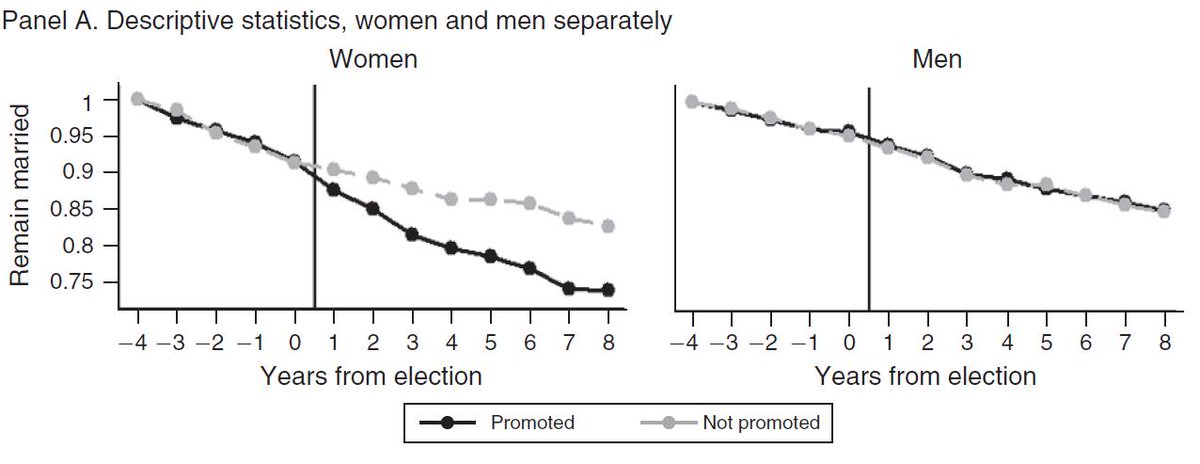Me and @johannarickne’s paper on promotion to top jobs and marriage stability was just published in AEJ: Applied Economics. This picture shows the main finding of the paper: promotion increases the divorce probability for women, but not for men. 1/10 https://pubs.aeaweb.org/doi/pdfplus/10.1257/app.20180435">https://pubs.aeaweb.org/doi/pdfpl...
We depart from the fact that women are underrepresented in top jobs throughout the world and across sectors of society. While some research points to the importance of family constraints in explaining women’s absence, there is no research on how promotion affects divorce. 2/10
In our main analysis, we examine the causal impact of promotions to top political jobs in Sweden. Politics is unique in the sense that we can identify the job contenders, who gets the promotion, and how close the contest was. 3/10
The first graph in this tread showed the descriptive comparison of job-contenders for Mayor or Parliamentarian. This Figure shows D-i-D estimates. A host of robustness checks validate the design, including a restriction to quasi-random promotions in close elections. 4/10
For promotions to CEO, we can only compare promoted men with promoted women. This comparison shows an acceleration of divorce after promotion for women but not for men. The results from politics seem to extend to the private sector. 5/10
Why is there a negative effect? A “temptation effect” would imply that promoted women meet a bunch of hot guys and “trade up”. An audience of female politicians will usually crack up when they hear this. Indeed, we see that promoted women are slow to enter new relationships. 6/10
We argue that traditional gender norms on couple formation may be behind the divorce effect. Most women in our data have “married up”, while the men have “married down”. Both men and women who reach top jobs have relationships that initially focused on the husband’s career. 7/10
Two variables approximate how traditional the marriage was in its early days (i.e. 20 years prior to the promotion): i) the spousal age-gap, and ii) the division of parental leave. Our analysis shows that women’s divorces are concentrated to the least egalitarian couples. 8/10
Divorce is not explained by “short term” factors such as passing the husband in income (most women in our sample out-earn their husband prior to the promotion). Rather, the promotion seems to be the final straw in a long process of moving away from the initial expectation. 9/10
What can we learn from this? Individual women might want to “pick the right husband”, as argued by successful Swedish politician @birgittaohlsson. At the macro-level, gender equality in the labor market will be hard to achieve without gender equality in couple formation. 10/10
Ungated pre-print version https://drive.google.com/file/d/0BzamTbRRFylyRXQ4V3VOcGJOZVE/view">https://drive.google.com/file/d/0B...

 Read on Twitter
Read on Twitter







